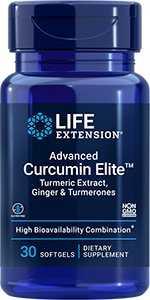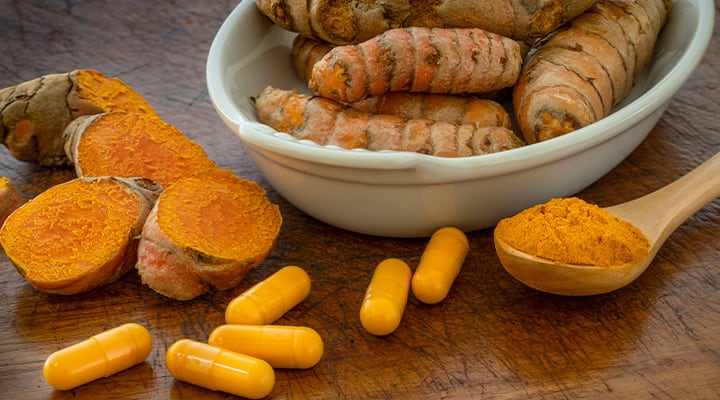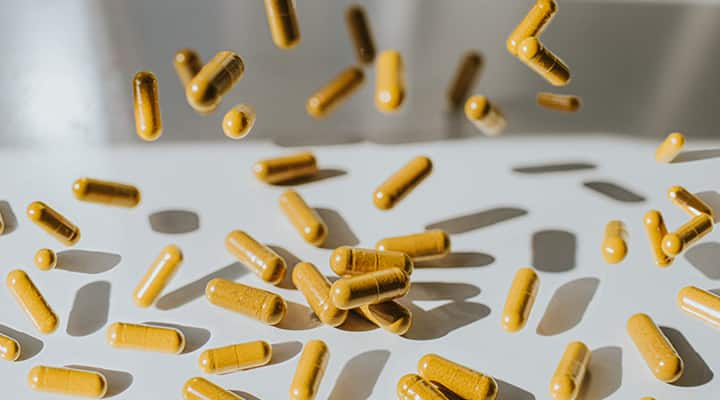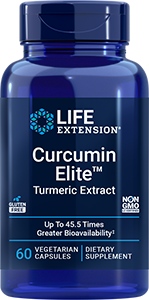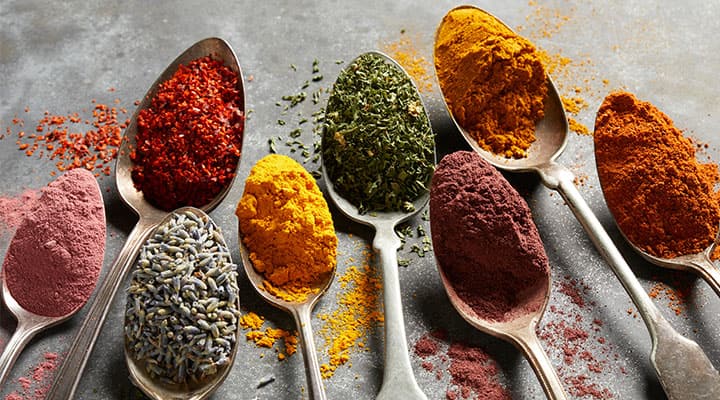
Curcumin vs. Turmeric: What Are the Real Differences?
Published: June 2025
You may have heard high praise for turmeric and curcumin because of their multiple health benefits, but are they the same thing?
The answer is…it's complicated! Curcumin is part of turmeric, but it's not the same as turmeric. Turmeric has been used for centuries in several cultures, including Ayurveda and Chinese health regimens. However, curcumin, one of the compounds that make up turmeric, has been taking center stage in wellness and scientific research.
Let's explore what makes them different and why it matters for your health. Plus, we'll give you the info you need to decide whether you should take a turmeric or curcumin supplement.
What is turmeric?
Sometimes referred to as Curcuma longa, turmeric is a ginger-like plant native to Southeast Asia and India. Like other plants in the ginger family, its root is used as a powdered spice (hence its common moniker, the golden spice).
While this herb is tasty and colorful, it also has several health benefits, making it a go-to superfood in the kitchen and wellness routines.
It has been used for over 5,000 years around the world. In traditional Chinese practices, turmeric was used to promote blood circulation, and in Ayurvedic traditions, it's been used to support immune system function, lung and gastrointestinal health and even the appearance of the skin. It even has a long-standing history for its use in religious ceremonies and as a coloring agent for food and cosmetics.
Pro tip: You can creatively incorporate turmeric into your diet—whether you prefer a savory salad dressing or a warm and comforting golden latte or moon milk.
Today, turmeric is used to help inhibit inflammation to support brain, metabolic, and joint health. Turmeric is also considered a powerful antioxidant and can protect cells from free radicals.
Turmeric has many components (including curcumin!) that can benefit your health. However, different turmeric supplements have various levels of curcumin and are not all standardized. (More on that in a minute.) In other words, curcumin is a piece of the puzzle that makes up turmeric.
What is curcumin?
Curcumin is one of the components that make up the turmeric plant and is made up of three main curcuminoids (curcumin-like substances).
Curcumin is considered the most prevalent and potent substance in turmeric and is often used in clinical trials investigating this compound's health benefits. Unfortunately, the turmeric root has a low curcumin concentration and low bioavailability, meaning the body has difficulty absorbing and using it.
Nature helps absorption by including oils in the turmeric root. However, because curcumin is not present in the turmeric plant in a very high percentage, a better way to obtain more curcumin is to extract it at a high percentage and then add other materials to help the body use it.
It's for this reason that standardized is considered to be much better than simple isolated curcumin, which is why it's a good rule of thumb to seek out high-quality standardized formulas for optimal benefits.
Some extracts also use added ingredients to increase the amount of curcumin absorbed and used by the body. This ensures that your curcumin supplement is more bioavailable and easier for your body to use.
Key differences between turmeric and curcumin
In a nutshell, turmeric is a plant that contains curcumin (not the other way around). Curcumin is one of many compounds found in turmeric, like a star player on a sports team. Turmeric contains curcumin, along with many other valuable substances like turmerones and essential oils. Curcumin is the most extensively studied compound, particularly in terms of its antioxidant activity.
This table can help you understand the differences between turmeric and curcumin:
| Turmeric | Curcumin | |
|---|---|---|
| What it is | A plant root (rhizome) | A plant compound (polyphenol) found in turmeric |
| Usage | More commonly used as a spice, food coloring and traditional herb, though sometimes used as a supplement | Dietary supplement |
| Curcumin percentage | 3-5% of turmeric consists of curcuminoids | 77% of the total curcuminoids found in turmeric |
| Absorption | Varies from plant to plant | Requires additional ingredients to aid with absorption |
| Concentration | Low, since only a small amount of turmeric consists of curcuminoids | High, since curcumin is the main bioactive component responsible for health benefits |
Explore Our Best Curcumin/Turmeric Supplements
What are the health benefits of curcumin?
Now that you have a better understanding of curcumin, let's dive into how this compound can help maintain health. A high-quality curcumin supplement offers the following health benefits:
Promotes a healthy inflammatory response—
Inflammation is the body's natural response to factors that can impact its healthy function. Curcumin and other supplements can influence many of the cells and chemicals in the body that are responsible for this process. Curcumin also acts as an antioxidant, which can help maintain healthy aging and whole-body health.Heart health hero—
Curcumin's antioxidant actions have an additional benefit: they promote optimal heart health. This plant compound supports the normal function of blood vessels and helps maintain already-healthy cholesterol and blood pressure. Curcumin can also encourage the health and integrity of arterial walls for an overall healthy cardiovascular system.Encourages brain health—
A healthy inflammatory response can help you maintain cognition and brain health as you age. Curcumin encourages the production of brain-derived neurotrophic factor, a compound known to maintain brain health.For a healthy immune response—
Curcumin supports healthy immune cell response by affecting the cells responsible for patrolling the body, like macrophages, B cells, and T cells. It can also support the body's ability to make the vital proteins that protect against invaders. Moreover, immune function naturally declines with age, and curcumin can help inhibit inflammation to promote a healthy immune response in older adults.Good-to-the-gut digestive health benefits—
Curcumin can influence the digestive system by promoting a healthy inflammatory response and interaction with the gut microbiome. Curcumin can support health in the liver, colon, small intestine, and pancreas. Furthermore, the gut microbiome is the body's first line of defense, and turmeric acts as a prebiotic, or food, for the good bacteria. Many of these bacteria react positively to curcuminoids, optimizing overall well-being.Supports joint health—
Healthy joints move more easily, have less stiffness, and help you perform your daily activities. Curcumin not only promotes the health of your joints, but also healthy cartilage, the substance that cushions joints.
Should you choose a turmeric or curcumin supplement?
Choosing the best supplement to support your well-being depends on your goals. When you take a turmeric supplement or enjoy it as a spice, you are consuming a variety of compounds, but only a small amount of curcumin. With curcumin supplements, you are zeroing in on one specific compound. To maximize health benefits, consider a higher dosage, bioavailability and formulation of curcumin.
There is one catch with curcumin supplements, however: curcumin extract's low absorption rate of curcumin into the body and its susceptibility to a process called conjugation. Think of conjugation like a locked suitcase. Your body knows it is there, but it cannot access anything inside to use it, much like you wouldn't be able to use your bathing suit on vacation. Once curcumin is conjugated, or bound, to another compound, it is difficult for the body to use.
This is why it's so important to purchase a high-quality curcumin supplement, which will be augmented with certain ingredients—like a compound called galactomannan, which is found in fenugreek seeds. These "helpers" can help promote absorption and increase the amount of curcumin available to the body, as well as help keep curcumin from conjugation.
Another way to get even more out of your supplement is by looking for formulas that contain complementary plant extracts that work synergistically. This means that the substances in the plant work together to create an effect larger than they could create on their own. Think of synergy as a band; curcumin is the lead singer but needs the drummer, bassist, and guitarist to have the best sound. Adding synergistic compounds such as standardized ginger and turmerones from turmeric oil helps curcumin's ability to promote health and wellness.
Your takeaway: aim for supplements with high amounts of curcumin, standardized quality, and ingredients that help curcumin shine.
Are there any potential side effects and interactions?
As with any supplement, you should take curcumin as directed on the product label. If you have any specific concerns or questions, consult your doctor before taking any new supplement.
Get to supplementing!
While turmeric is a celebrated superfood with a rich history, curcumin is the star compound inside that delivers the powerful health benefits. However, curcumin alone isn't enough.
If you're looking to unlock the full potential of turmeric, a high-bioavailability curcumin supplement is the wise, science-backed choice for supporting your long-term health.
And if you're still not sure what you may need, take our quiz for customized recommendations.
About the Author: Erin Gillespie is a physician specializing in Internal Medicine, Integrative Medicine, and Obesity Medicine, with advanced certifications in nutrition, supplements, and herbal therapies. Erin is passionate about helping people understand how evidence-based nutrition, fitness, and supplementation can support optimal health at every stage of life. She has a certification from the Institute for Integrative Nutrition, and she studied Integrative Medicine and Nutrition with Dr. Andrew Weil.
References
- Allegra A, et al. "The Impact of Curcumin on Immune Response: An Immunomodulatory Strategy to Treat Sepsis." Int J Mol Sci. November 2022. https://doi.org/10.3390/ijms232314710
- Aryaeian N, et al. "The effect of ginger supplementation on some immunity and inflammation intermediate genes expression in patients with active Rheumatoid Arthritis." Gene. May 2019. https://pubmed.ncbi.nlm.nih.gov/30844477/
- Atefi M, et al. "A Systematic Review of the Clinical Use of Curcumin for the Management of Gastrointestinal Diseases." Adv Exp Med Biol. 2021. https://doi.org/10.1007/978-3-030-56153-6_18
- Bańkowski S, et al. "Does curcumin supplementation affect inflammation, blood count and serum brain-derived neurotropic factor concentration in amateur long-distance runners?" PLoS One. January 2025. https://pubmed.ncbi.nlm.nih.gov/39808679
- Basham SA, et al. "Effect of Curcumin Supplementation on Exercise-Induced Oxidative Stress, Inflammation, Muscle Damage, and Muscle Soreness." J Diet Suppl. 2020. https://doi.org/10.1080/19390211.2019.1604604
- Bideshki MV, et al. "The efficacy of curcumin in relieving osteoarthritis: A meta-analysis of meta-analyses." Phytother Res. June 2024. https://pubmed.ncbi.nlm.nih.gov/38576215/
- Cox FF, et al. "Protective Effects of Curcumin in Cardiovascular Diseases—Impact on Oxidative Stress and Mitochondria." Cells. January 2022. https://www.mdpi.com/2073-4409/11/3/342
- Dei Cas M, et al. "Dietary Curcumin: Correlation between Bioavailability and Health Potential." Nutrients. September 2019. https://doi.org/10.3390/nu11092147
- Fança-Berthon P, et al. "Pharmacokinetics of a Single Dose of Turmeric Curcuminoids Depends on Formulation: Results of a Human Crossover Study." J Nutr. July 2021. https://doi.org/10.1093/jn/nxab087
- Francis AJ, et al. "Curcumin and Cognitive Function: A Systematic Review of the Effects of Curcumin on Adults With and Without Neurocognitive Disorders." Cureus. August 2024. https://doi.org/10.7759/cureus.67706
- Goulart RA, et al. "Effects of the Use of Curcumin on Ulcerative Colitis and Crohn's Disease: A Systematic Review." J Med Food. July 2021. https://pubmed.ncbi.nlm.nih.gov/33155879/
- Jäger R, et al. "Comparative absorption of curcumin formulations." Nutr J. January 2014. https://doi.org/10.1186/1475-2891-13-11
- Kotha RR, et al. "Curcumin: Biological, Pharmaceutical, Nutraceutical, and Analytical Aspects." Molecules. August 2019. https://doi.org/10.3390/molecules24162930
- Lukkunaprasit T, et al. "An updated meta-analysis of effects of curcumin on metabolic dysfunction-associated fatty liver disease based on available evidence from Iran and Thailand." Sci Rep. April 2023. https://pubmed.ncbi.nlm.nih.gov/37037891/
- Panda SK, et al. "The enhanced bioavailability of free curcumin and bioactive-metabolite tetrahydrocurcumin from a dispersible, oleoresin-based turmeric formulation." Medicine (Baltimore). July 2021. https://doi.org/10.1097/md.0000000000026601
- Pastorelli D, et al. "Phytosome complex of curcumin as complementary therapy of advanced pancreatic cancer improves safety and efficacy of gemcitabine: Results of a prospective phase II trial." Pharmacol Res. June 2018. https://pubmed.ncbi.nlm.nih.gov/29614381/
- Peng Y, et al. "Anti-Inflammatory Effects of Curcumin in the Inflammatory Diseases: Status, Limitations and Countermeasures." Drug Des Devel Ther. 2021. https://doi.org/10.2147/dddt.S327378
- Sorng S, et al. "Quality assessment of Curcuma dietary supplements: Complementary data from LC-MS and (1)H NMR." J Pharm Biomed Anal. April 2022. https://doi.org/10.1016/j.jpba.2022.114631
- Tayyem RF, et al. "Curcumin content of turmeric and curry powders." Nutr Cancer. 2006. https://doi.org/10.1207/s15327914nc5502_2
- Zhao J, et al. "Efficacy and safety of curcumin therapy for knee osteoarthritis: A Bayesian network meta-analysis." J Ethnopharmacol. March 2024. https://doi.org/10.1016/j.jep.2023.117493
- "Turmeric." National Center for Complementary and Integrative Health. https://www.nccih.nih.gov/health/turmeric
Like what you read?
Please subscribe to get email updates on this blog.

